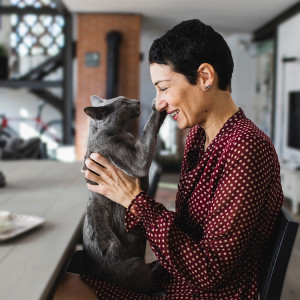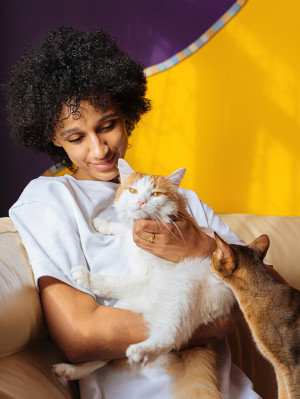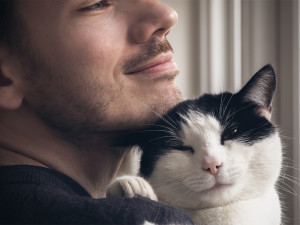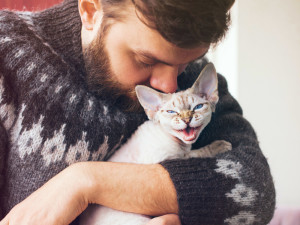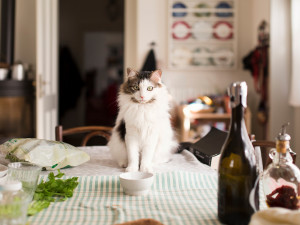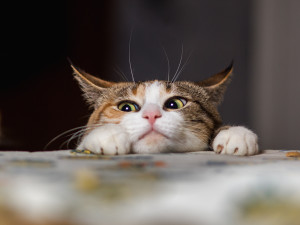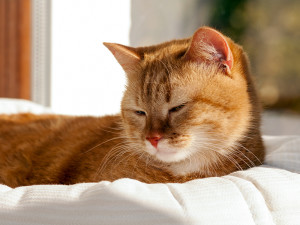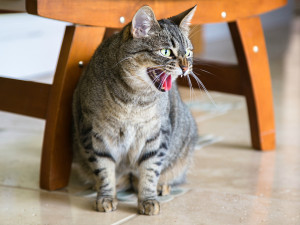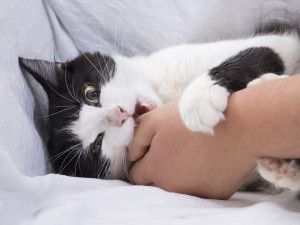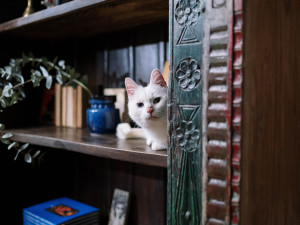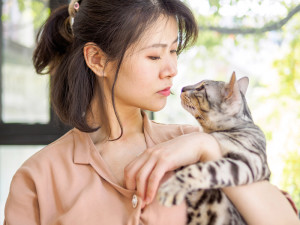The Feline Five Is a Personality Test That Could Actually Be Useful
You could solve the mystery that is your kitty.
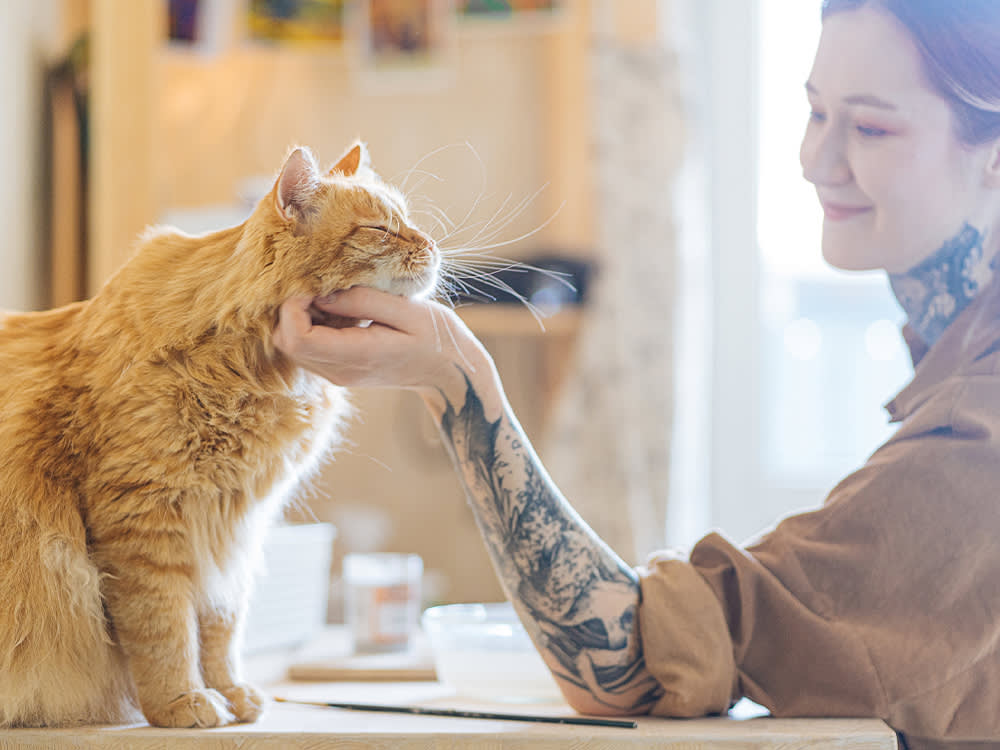
share article
Cats have a reputation for being aloof, but any cat parent who is currently batting away an enthusiastic paw from their Zoom screen can tell you that’s...not always true. Some confidently approach strangers with their tail highopens in a new tab, looking like a question mark, which means they actually want to hang out. But another cat might take one look at an unfamiliar person and slink into the shadows. Every cat is different from the other, and they’re impossible to figure out, which is part of their charm.
Obviously, we all know that our cats are bursting with personality. And yet, somehow research has barely scratched the surface of feline identity compared to dogs. Enter: the Feline Five.
What is the Feline Five?
The Feline Fiveopens in a new tab is the result of a 2017 study led by researcher Dr. Carla Litchfield, a conservation psychologist who studies the reciprocal relationships between humans and nature.
Delving into a cat’s psyche might seem like a scary journey to embark on, but there’s a reason why we’re fascinated by the way these little creatures work. Humans have been obsessed with cats for thousands of years, but compared to dogs or even apes, we know so little about their behavior, beyond body language and vocalizations. And, most of what we do know comes from shelters, feral coloniesopens in a new tab, and sadly, laboratoriesopens in a new tab.
This leaves a big knowledge gap in what makes house cats tick, beyond basic body language cuesopens in a new tab and their vocalizationsopens in a new tab. But what if we knew our cats better? According to this research, it could improve our relationships with our kitties by helping us understand their needs. A personality assessment could even help match adoptable cats with their perfect human companion.
The study examined 2,802 adult house cats from 2,291 pet parents living in South Australia and New Zealand. Then, researchers asked cat parents to psychoanalyze their feline companions using a 52-item survey of personality traits, which featured descriptors, such as “shy,” “reckless,” “defiant,” “curious,” “jealous,” “vocal,” and “aimless.” And just like people, cats have a mix of these personality traits. So, pet parents were asked to rank these quirks on a seven-point scale ranging from “not at all” to “very much so.”
Breaking down the Feline Five
Of the 52 traits, five emerged as reliable personality factors of the feline psyche, drawing from the five-factor model of personalityopens in a new tab for humans: Neuroticism, Extraversion, Dominance, Impulsiveness, and Agreeableness. Here’s what they mean.
Neuroticism
Neuroticism reflects traits such as insecure, anxious, suspicious, shy, and fearful of people. They might prefer a home with plenty of hiding places as well as quiet spaces, like a room that gets little foot traffic.
Extraversion
Extraverted cats are smart, curious, and inventive. They can figure out how to open doors and how to summit the highest point in your home. These cats might need stimulation — such as toysopens in a new tab, sensory items, space to unleash the zoomies, and bonding time with people and other pets — to prevent boredom and shredded furnitureopens in a new tab.
Dominance
A cat who scores high in dominance might bully other cats, which could stem from a natural drive to compete for resources. These cats may prefer to be the only pet in the household. The study notes that further research may be needed to understand how to improve cat welfare.
Impulsiveness
Impulsive cats are known to be erratic and reckless, like serenading the entire household to a chorus of meows in the middle of the night or accidentally knocking over objects in a furniture-scaling burst of energy. This type of behavior could indicate that your cat feels stressed. The good news is that you can try to pinpoint the source of their stress. If that doesn’t work, you may need to get in touch with your local behavioristopens in a new tab.
Agreeableness
An agreeable feline is well-adjusted, friendly, and their body language says “happy.” These cats might love to cuddle, and they confidently stride up to strangers, demanding pets and head-scratches.
How can it help cat parents?
Learning where your cat falls in the “Feline Five” spectrum is as entertaining as those hours you spent taking Quizilla quizzes in the early aughts. But, it also serves a practical purpose, in the form of helping us know what cats need.
For example, a cat in the “Dominant” category might need to be the only pet in the household. Agreeable cats will likely want more social time, so if you work long hoursopens in a new tab, they might feel less lonely with another catopens in a new tab in the house. You may just have to give up on leaving breakable tchotchkes, houseplants, and glasses within your cat’s reach if your cat falls under “Impulsive.” Understanding your cat’s personality could help you figure out the age-old question of “why does my cat do that?” — and what to do about it.

Kat L. Smith
Kat L. Smith is a writer and editor based in Queens, New York. They have written for LIVEKINDLY about a wide range of topics related to sustainability, lifestyle, house plant care, and food. They share their apartment with their adopted dog, Layla, and Vivi, a one-eared cat.
Related articles
![Cat grabbing onto ledge of table and looking to the left]() opens in a new tab
opens in a new tabWhy Does My Cat Follow Me Everywhere?
Yes, they are right behind you.
![Red cat with squinted eyes laying in a basket closeup]() opens in a new tab
opens in a new tab6 Ways Your Cat Could Tell You They Are in Pain
Here are all the way your kitty is trying to tell you they’re hurting.
![cat hissing under chair]() opens in a new tab
opens in a new tabCat Hissing: Fair Warning or Fighting Words?
Your cat’s hissy fit could mean Don’t test me or Let’s do this. We wouldn’t call their bluff.
![cat biting person's hand]() opens in a new tab
opens in a new tabWhy Does My Cat Bite Me?
Don’t live in fear of your feline overlord.
- opens in a new tab
Why Is My Cat Hiding?
No, they’re not on the lam. Here are four reasons your cat might be MIA.
![Cat looking at human]() opens in a new tab
opens in a new tabDoes Your Scent Actually Help Calm Your Cat?
They want you around more than your sweaty T-shirt in their carrier, but thanks for the thought.
